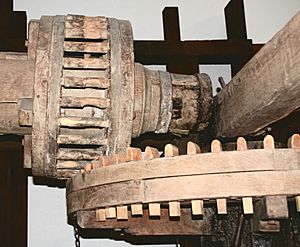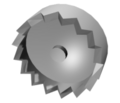Crown gear facts for kids

A crown gear is a special type of gear that looks a bit like a crown. Instead of having flat teeth, its teeth stick out at an angle, usually a right angle (90 degrees). Imagine a wheel with teeth around its edge, but these teeth point upwards or downwards, not sideways. This unique design helps them transfer power and motion in a different way compared to regular gears.
Contents
What is a Crown Gear?
A crown gear gets its name because its teeth are arranged around a flat ring, making it look like a royal crown. These teeth are not on the side of the gear, but on its face. This means they can connect with another gear, often a small pinion gear, at a 90-degree angle.
This special design allows crown gears to change the direction of motion. For example, if one gear is spinning horizontally, a crown gear can make another gear spin vertically. They can also be used to change the speed of rotation between two shafts.
How Crown Gears Work
When a crown gear meshes with another gear, their teeth fit together perfectly. As one gear turns, it pushes the teeth of the other gear, making it spin. Because the teeth of a crown gear are on its face, they can transfer power at an angle.
This is different from many common gears, which usually transfer power between shafts that are parallel to each other. Crown gears are useful when you need to change the direction of power in a machine.
History of Crown Gears
Crown gears have been around for a very long time. People used them in ancient times and throughout the Middle Ages. They were important parts of early machines like mills that ground grain. They also appeared in some of the first clocks.
These gears were vital for making complex machines work. They helped people control movement and power before modern technology existed. Their simple yet effective design made them a popular choice for centuries.
Why Were Crown Gears Replaced?
In more modern times, crown gears were largely replaced by another type of gear called a bevel gear. Bevel gears also transfer power at an angle, but their teeth are shaped differently. Bevel gears have teeth on a cone-shaped surface, while crown gears have them on a flat ring.
One main reason for this change is that it's easier to make very accurate bevel gears. The calculations needed to design and build bevel gears are simpler for engineers. This makes them better for high-speed machines and situations where very precise movement is needed.
Even though bevel gears are more common now, crown gears are still sometimes used in specific machines. They are a great example of clever engineering from the past.
Images for kids
 | Lonnie Johnson |
 | Granville Woods |
 | Lewis Howard Latimer |
 | James West |


